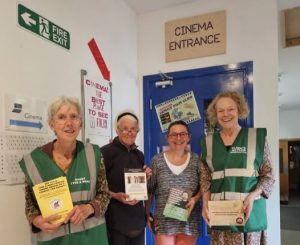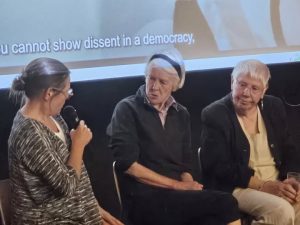
I am indebted to Climate Action Newcastle for making me aware of the crucial screening of The Line We Crossed at The Star and Shadow, Newcastle. This film presents a potent British story of dissent, drawn from the frontlines of climate resistance, and through the experiences of those who stood in defiance, it also traces the quiet unraveling of our protest rights.

The film challenges audiences to deeply question what truly makes dissent effective and where the line of acceptability is drawn in a democratic society. The right to nonviolent protest is, after all, a fundamental pillar of democracy and enshrined in many international laws to which the UK government are signatories. Yet, as the film starkly portrays, the right to protest in the UK has come under increasing threat. Environmental defenders, in particular, are being targeted, facing silencing in court, criminalisation, and disproportionate punishments for nonviolent protest. The film notably includes powerful clips from an interview with Michel Forst, the UN Special Rapporteur on Environmental Defenders under the Aarhus Convention, lending an international human rights perspective to the issues being highlighted.
As Liz Smith, the film-maker, powerfully writes:
“In the UK, over the last two years we have steadily been losing our right to protest. While environmental defenders have been the main target of these anti-protest laws, those law changes affect us all: if your cause falls out of favour with the authorities they can clamp down on you too now.
For the last two days there has been a mass appeal taking place at The Royal Courts Of Justice in London reviewing the excessive sentences that have been handed out in recent months to climate activists. Today, over a thousand people gathered together and sat quietly in the main road outside the court. They were allowed to remain there for the full 90 minutes of their action. The Police tried to encourage them to move to the pavement. They told them there was a chance of arrest if they did not, but the people sat there quietly and did not move.” (Links as per https://lizsmithpage75.substack.com/p/a-lesson-in-solidarity)
This clampdown, heavily influenced by recent legislative changes, forms the backdrop against which the film portrays the actions of the Just Stop Oil campaign. The government has progressively tightened laws restricting protest, building upon the Public Order Act 1986. This framework has been significantly reinforced by two major pieces of legislation:
- The Police, Crime, Sentencing and Courts (PCSC) Act 2022 notably expanded police powers, broadened the definition of “serious disruption,” removed distinctions between static and moving protests, and increased penalties for certain offences.
- This was followed by the Public Order Act 2023, which introduced new criminal offenses like “locking-on,” “tunnelling,” obstructing transport, and interfering with national infrastructure. It also enabled Serious Disruption Prevention Orders (SDPOs) and lowered the threshold for police intervention, making it easier to curtail protests.
- Further Criminal Justice Bill amendments have targeted specific actions, including powers to arrest protesters wearing face coverings or using pyrotechnics, and critically, the removal of “reasonable excuse” defences for certain disruptive acts.
These legislative changes are highly controversial. Critics, including human rights organizations, argue that the combined measures will have a “chilling effect” on the right to protest, discouraging legitimate peaceful demonstration due to the increased risk of arrest and disproportionate penalties. The broad framing of new offenses and the lowered threshold for “serious disruption” are seen as open to misuse and potentially criminalizing ordinary protest tactics. The government, conversely, asserts these measures are necessary to protect the public and businesses from the “unacceptable actions” of a minority of protestors.
The Just Stop Oil campaign, the focus of the film, is one of personal stories of bravery and passionate motivation set against this unyielding state. One such powerful account comes from Sam Griffiths, who wrote on November 9, 2023:
“I was remanded to Wandsworth Prison because I walked slowly in the road with about 40 other supporters of Just Stop Oil and we were there for a maximum of 20 minutes. I will be in here at least until my court date of November 30th. 28 days in total. Apparently we breached section 7 of the new public order act. I am shocked at how willing the police and the courts are to embrace this authoritarian and repressive legislation. Where is their moral backbone? Who are they serving? And who do they protect? It’s clear that they still believe we can arrest our way out of the climate crisis without actually taking any positive action to address the underlying issue.”
This personal testimony exemplifies the very concerns raised by critics regarding the escalating laws. The rhetorical question posed in the film, “Why did the Government relentlessly pursue a retired social worker on the charge of contempt of court?”, resonates deeply within this context, highlighting the severity and perceived disproportionate application of these new legal tools against individuals engaging in protest. Liz Smith uses clips from some of the footage she shot for the documentary film “The Environmental Defenders” and talks with Jolyon Maughan, founder of Good Law Project, and Trudi Warner.
Sam Griffiths, Graphic Designer, Reckless and Culpable Conduct, 16 months sentence

The significance of this screening in Newcastle was amplified by its status as the public premiere, attended by Liz Smith (the film’s author), Trudi Warner (featured in the film), and Sam Griffiths’ mother, who proudly represented Sam as he himself was unable to attend. These three stayed for a powerful Q&A session after the screening, engaging directly with the audience on a range of critical topics.

Discussions touched upon the need to defend our jurors and protect their independence. Michel Forst, in the film’s interview, expressed deep concern that judges in the UK would “ask the jury to leave the room and to discuss with the defendant,” preventing protestors from presenting their full defence and explaining their motivations to the jury – a practice he finds “difficult to understand how a democracy would not be able to allow the defendant to present the events properly.” He also expressed shock at the arrests for holding signs near courts stating “juries have the right to hear the whole truth,” noting he had “not seen that in other countries in fact.”
Sam’s mother spoke of a forthcoming book, written from the perspective of him answering the questions from fellow prisoners, offering a unique, powerful and personal impact of these escalating laws.
The controversial “terrorist” label sometimes applied to climate activists was a key point of discussion. Forst noted politicians, including those in the UK, using terms like “eco-zealots” or “eco-terrorists,” stating this aims to “vilify the cause” itself, not just the individuals.
The role of the Climate Media Coalition in countering mainstream narratives was also explored. Forst highlighted his concerns about the increasing number of journalists being arrested while covering protests, like the film’s author, and the rise of Strategic Lawsuits Against Public Participation (SLAPPs) targeting journalists who uncover corporate or government collusion.
Concerns were raised about informing disinformation and the government’s irresponsible approach to these issues. Forst noted a clear disparity in how protests are policed, citing examples of farmers in other European countries blocking roads for days with no arrests, while climate activists using similar tactics face severe repression. He emphasized that international law, specifically the International Covenant on Civil and Political Rights (ICCPR) Article 21 and Human Rights Committee General Comment 37, explicitly covers civil disobedience and accepts disruption as part of legitimate protest, provided it is non-violent. He stated that the UK “apparently is not fulfilling all the obligations” under the treaties it has ratified. Furthermore, he revealed that the UK government had failed to reply to his official “Letters of Allegation” regarding complaints from UK environmental defenders, leading him to issue a public statement and consider referring the cases to the Aarhus Convention’s Compliance Committee, which could have further political implications for the UK at the UN.
Participants explored the potential of alternative media and alternative democracy models. The environmental and political activist group Youth Demand and their urgent call for action. The discussion also covered the challenges of censorship, noting that no one wanted to touch the film so Page75 Productions had to self-distribute, and the need for robust checks and balances in alternative media. The conversation broadened to include the human rights hypocrisy observed in the UK’s stance, the alarming trend of escalating laws, and the collective sentiment that “this isn’t okay.” Ultimately, the dialogue consistently returned to the importance of defending justice, with a clear recognition that “the hammer is coming down hard because protest is working,” implying that the state’s aggressive response is a sign that protest is indeed effective and therefore perceived as a threat.
This event serves as a potent reminder that the fight for climate justice is inextricably linked to the fight for fundamental democratic rights. It urges us all to understand the evolving legal landscape, to support those on the frontlines of dissent, and to actively participate in shaping a future where the right to voice concern remains unassailable.
Find out more about the film at : https://www.thelinewecrossed.com
Where next? Use the links below:
Facebook: Our community space and new content information







